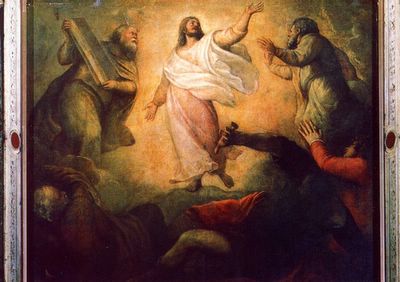It's understandably difficult for us to wrap our heads around this fully human, fully divine Jesus. So historically Christians have tended to overemphasize one Jesus over the other. In the Middle Ages, Jesus was a rather distant and frightening figure; his goodness too good to endure, his suffering too terrible to contemplate. The Eucharist -- God's gift of grace and spiritual nourishment to the people of God -- often became something too precious for common people to partake; "Take and eat" became "See and adore." Saints seemed more human, more able and willing to involve themselves in human affairs than the intimidating Christ of the popular imagination; they increasingly became the middlemen and -women in human interaction with the Divine.
The Reformation came as a needed correction to this loss of the Gospel message. But in the centuries to come the pendulum began to tilt in the other direction, helped on one hand by biblical deconstructionists who approached scholarship with the attitude of "This can't possibly be right," and on the other hand by Pietists whose emphasis on a personal relationship with Jesus and insistence on minimalist worship tended to, for all intents and purposes, dethrone the Cosmic Christ and turn the salvation story into a private me-n-Jesus-under-the-blanket-with-a-flashlight drama, in a cynical and superficial culture (including Christian culture) that has lost its grasp of concepts like sanctity and holiness and mystery.
What today's Gospel lesson said to me as I was reading and rereading it, was that we can't have one Jesus without the other. The very human, flesh-and-blood Jesus we meet earlier in Mark -- the teacher, the healer, the individual who reached out to other individuals, the Jesus who had to contend with blockheaded disciples and intrusive crowds and hostile religious leaders -- is also the Jesus of the Transfiguration, a figure so glorious that his closest friends fall on their faces in awe.
I believe that we are living in a time when people are hungering and thirsting for connection with the numinous, the holy. They want to, as one Catholic cleric put it, celebrate the Mystery. Popular culture can't help them. Sadly, many Christian churches these days can't help them either.
One of my ministerial mentors describes church as "a place where God happens." I think all of us who belong to faith communities need to think about how we create sacred space -- space where God happens -- in our worship services and small groups. Sometimes we need Jesus to be our friend -- but sometimes we also need Jesus to be "Holy, holy, holy, Lord God Almighty." The mystery of our faith is that Jesus is both. But is that truly reflected in how we live...how we speak...how we worship?
"The Transfiguration," Titian


1 comment:
Beautiful post. About your B'net group on Lent, I bet you are a great DG leader--I'm just not into the whole church calendar/liturgy thing.
Post a Comment